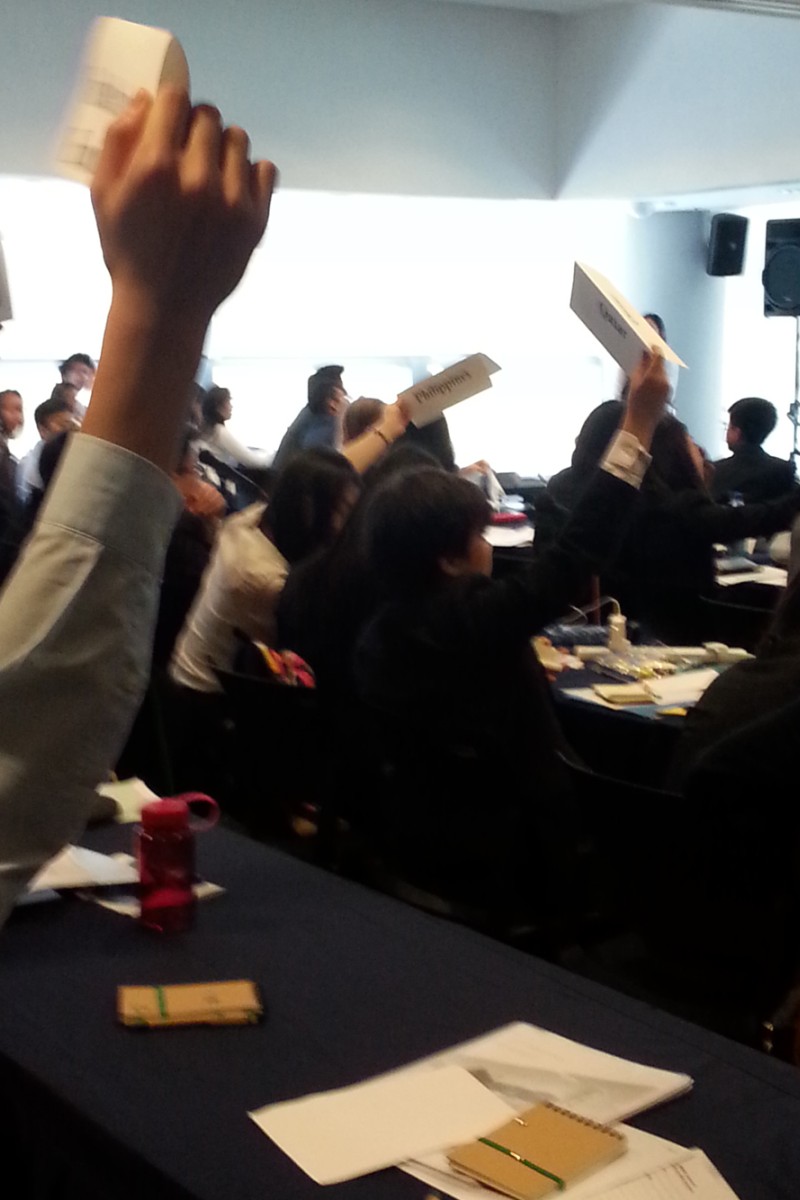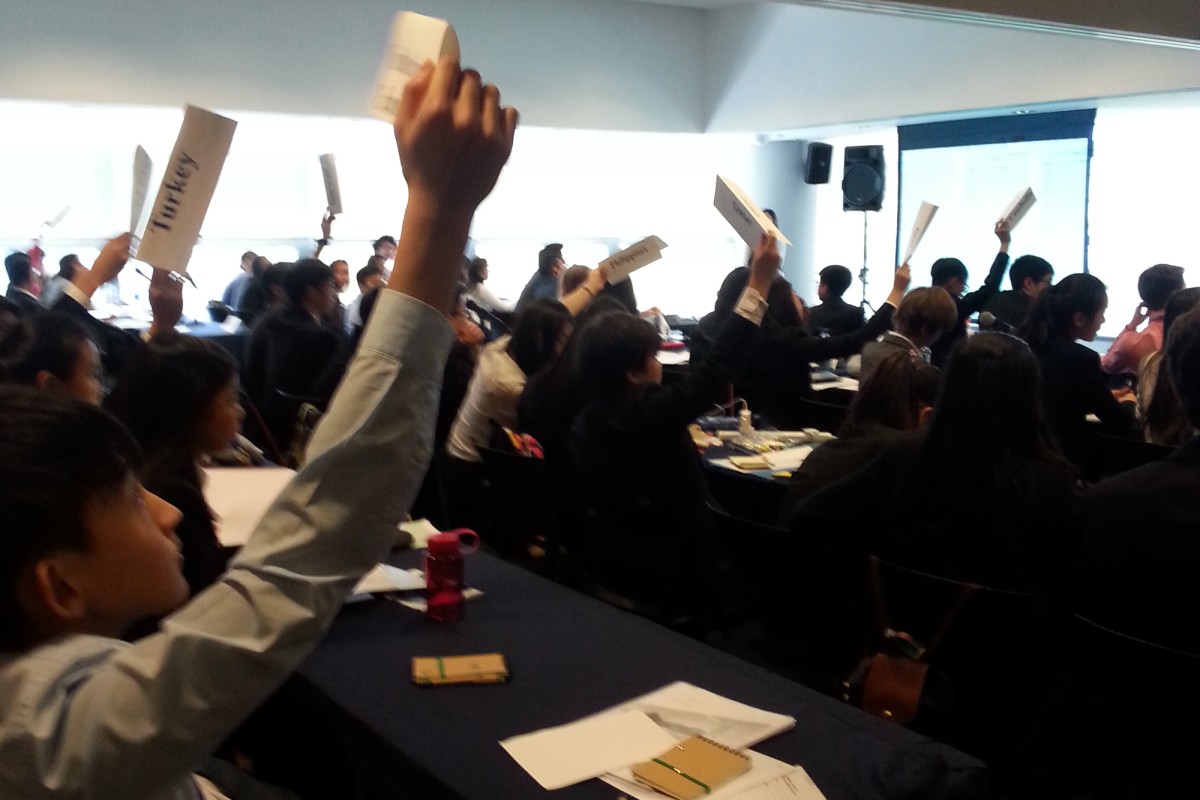
HKMUN: Breaking the ice and setting the pace on the first day
More than just a big scale debate, the Hong Kong Model United Nations conference is a chance for students to become true global citizens
 Student delegates at MUN voting on motions.
Student delegates at MUN voting on motions.The first day of Hong Kong Model United Nations (HKMUN) 2015 kicked off today at the Science Park. More than 300 students from 26 secondary schools across Hong Kong came together for the first day of the three-day conference.
HKMUN is an event that allows student delegates to engage in traditional General Assembly and Security Council committees. The objective is to provide a platform on which students can learn about globally significant issues. It is also a chance for them to improve their debating and negotiation skills and - perhaps most importantly - to get to grips with the complexity of international affairs.
During the opening remarks, as students shifted eagerly through their notes and research, the student-led board reminded the delegates that MUN is not a competition. Instead, the purpose is to foster dialogue and understanding of important world issues on social, cultural and political levels. By thoroughly researching each topic, delegates are meant to represent the views, actions and resources of their chosen country to accurately represent the complexity of the issues at hand.
After opening remarks, students separated into committees to better get to know one another and discuss more casually the issues on the docket. Along with the four standard committees - Historical General Assembly, Modern Security Council, Historical Security Council and Modern General Assembly or Social, Cultural and Humanitarian Committee (Sochum) - the Hong Kong MUN also introduced two new experimental councils to the event: the Legislative Council of Hong Kong (Legco) and North Atlantic Treaty Organisation (Nato).
The committees first played some icebreaker games, and began then a discussion of the general rules and procedures before digging into the topics themselves. It wasn’t long before the debates and discussions began in earnest.
By mid-afternoon, each committee was locked in sometimes heated discussions on key topics. Sochum tackled the issue of what happens to people who are forced out of their homes due to natural disasters, known as Environmentally Displaced Persons (EDP). Delegates from the Philippines went head-to-head challenging the UK delegates over whether EDP should qualify under the title of refugees.
Next door at Legco, things were even more heated as students took on the views - and sometimes personas - of council members. Universal Suffrage and the Chief Executive Election in Hong Kong have always been hot-button issues, and it was no different on the floor of MUN. Delegates passionately argued their points, objecting to the opinions of others who went against their party’s views.
The other committee rooms were just as intense. The Historical General Assembly tackled famine in Ethiopia, while the Modern Security Council discussed gender conflicts and the fight against Isis and the responsibility to protect. And experimental committee Nato took on the controversy of private military contractors.
Sha Tin College's Henry Lui, a delegate in the Modern Security Council and winner of the Best Workshop Report at the 2014 Young Post Junior Reporter Awards, said that "though every member of the Security Council agreed that Isis should be stopped, there were heated arguments about how the UN should act. As there were many points to tackle, we didn't quite finish the debate. It is due to resume tomorrow with the presentation of draft-resolutions."
This may only be Henry's second conference at MUN, but he's already realising the important soft skills the event teaches students.
"I learned how small details often get in the way of negotiations," he said. "Though all parties agreed on the overarching objective, no one was able to agree on the path UN Nations should take to destroy Isis."
Henry's debate is not the only one scheduled to resume tomorrow.
"Today we discussed the use of private military contractors," said Charlotte Chan of German Swiss International School, and a Nato delegate. "Since we have not finished writing up our communiqués, we will be resuming this tomorrow."
It was a full day of discussion, debate and diplomacy, but there were also light-hearted moments. For example, Catherine Wang of Chinese International School, who was also a delegate in the Modern Security Council with Henry, said that when their chairperson opened the floor to questions, "the UK delegate asked, 'how much wood would a woodchuck chuck if a wood chuck could chuck wood?' And the committee burst into laughter."
"One of the things I like about MUN is that you not only learn about the country you're representing, but the countries of other delegates, too," Catherine said. "I was fascinated to learn that New Zealand has recently joined the international fight against Isis and terrorism - I had always thought that the country was a peaceful, simple land of sheep and Hobbits!"
She also found the event a chance to get to know like-minded people.
"It was great meeting some very talented and passionate delegates who shared fascinating views on world politics."
Today was only the beginning. Delegates still have two more days of the conference to work through some of the world’s toughest issues.
